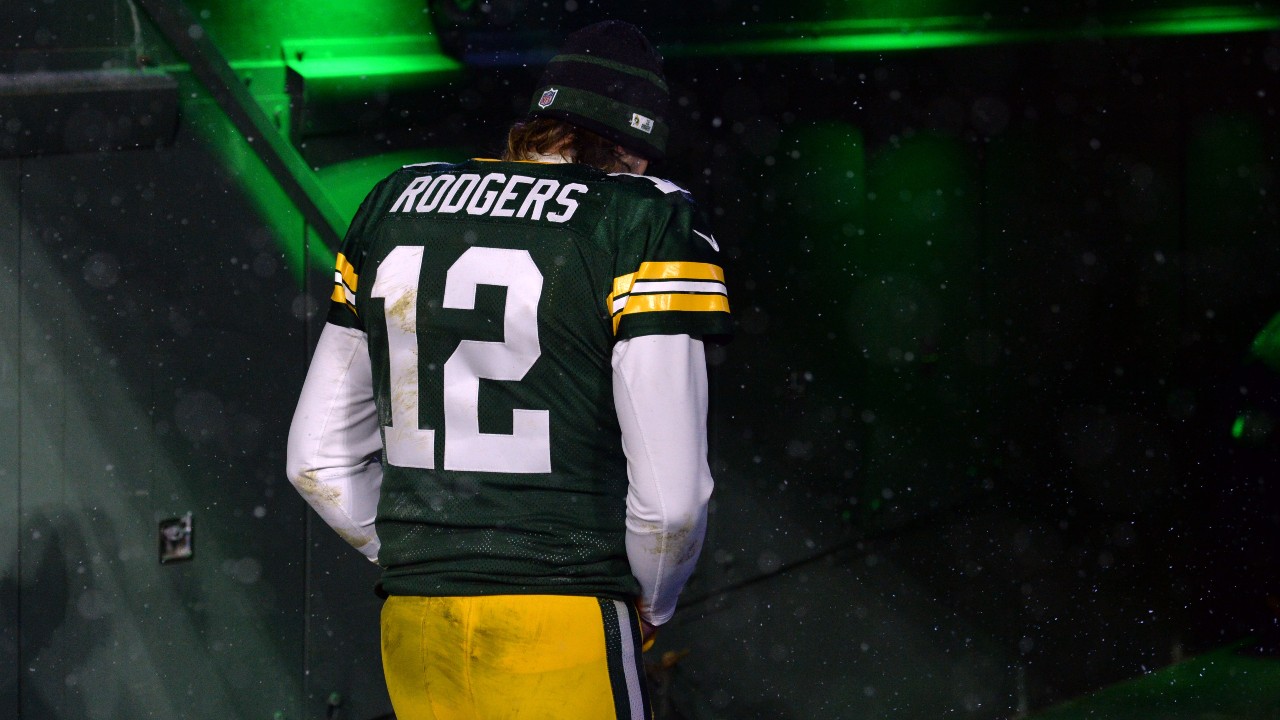
Do you remember when Packers quarterback Aaron Rodgers put out a tweet stating that the reported numbers of his contract were not correct? Well, guess what? The numbers are what numerous league reporters initially said they were. Looking at the numbers on Rodgers’ new deal can be complicated.
There’s a lot to dissect from the details reported by NFL Network on Tuesday morning. Before getting into the nuances of what the new deal means, here are the essential statistics from Ian Rapoport, Tom Pelissero, and Mike Garafolo.
- Rodgers’ contract is essentially now a three-year deal for a little more than $150 million, with two placeholder years tacked on after that.
- If Rodgers does not walk away after the 2024 season at the end of the three years, those two extra years will be restructured.
- In 2022, Rodgers gets $42 million, $59.515 million in 2023, and $49.3 million in 2024.
- Only the first two years are guaranteed at signing, so Rodgers is committing to two more years and possibly another one.
- In 2022, the Packers free up $18.2 million in cap space by extending Rodgers.
- His cap numbers for the next three seasons are, respectively, $28.5 million, $31.6 million, and $40.7 million.
- If Rodgers leaves after two more seasons, a dead cap hit of more than $68 million remains with the team.
What Does This Imply for the Packers and Their Fanbase?
Both sides can rest very easy recognizing they’ll have the four-time NFL MVP for the next two seasons. The Packers lower Rodgers’ cap hit for this year, as well as they’ll deal with the cap concerns brought on by this offer down the road when they arrive.
Before Rodgers’ new deal, the Packers were $21.9 million over the cap after the releases of linebacker Za’Darius Smith and guard Billy Turner, the extension for linebacker Preston Smith and the new deal for fellow teammate De’Vondre Campbell. Add a $3.986 million cap fee for wideout Allen Lazard’s reported second-round tender and show up around $25.9 million. Deduct the $18.2 million from Rodgers’ new deal, and the Packers go to $7.7 million over.
They would undoubtedly liberate $6.7 million by releasing wide receiver Randall Cobb, per Over The Cap (they might re-sign him later today on a much more team-friendly offer). The Packers need to get within salary cap compliance by 3 p.m. CT on Wednesday, the beginning of the brand-new league year, so another tiny action would need to be made to do so.
How Does this Effect Jordan Love?
Rodgers has essentially committed to at least two more years so that the Packers won’t exercise Jordan Love’s fifth-year option. Their decision to do so or not needs to come next offseason officially. Love’s salary on his fifth-year option, which would be fully guaranteed upon signing, would skyrocket. The league hasn’t yet determined that figure, but Green Bay wouldn’t house two quarterbacks with money figures that high at the same time in 2024.
They could re-sign Love after his rookie deal expires in March 2024 if Rodgers leaves after the 2023 season and the Packers still want Love as his replacement or to compete for the job. Then there’s the even more unlikely scenario that Rodgers plays all three seasons of his new deal, and Love draws so little interest as a potential starter from other teams in 2024 free agency that he re-signs with Green Bay for his fifth year to continue backing up Rodgers.
The bottom line is Love’s chances to one day start for the franchise are greatly diminished by Rodgers’ new deal. The Packers now must decide whether to trade him and recoup an asset in return before his trade value decreases even more or ride out his rookie contract and keep him as a backup who knows the system. General manager Brian Gutekunst told reporters last month that he’s “very doubtful” he’d take trade calls for Love.
What Is at Stake For Both Rodgers and the Packers:
Rodgers’ career will never be considered a failure, but the Packers have to win a Super Bowl in the next three seasons, or for however long Rodgers plays for them. Plain and simple. It might be their last genuine chance for the foreseeable future because a post-Rodgers quarterback picture is cloudy at best. Any year without a Super Bowl title for a team whose quarterback is as good as Rodgers can’t be considered a resounding success, but there’s added pressure for Rodgers and the Packers given the magnitude of his deal and what the team mortgaged to keep him for at least the next two seasons.
Whatever “all-in” means, the Packers are committed for the remainder of the Rodgers’ era in Green Bay. They’ve already proven they can keep critical pieces around him; the likes of Adams (assuming he ends up playing), Campbell, Lazard, and Preston Smith already retained this offseason. Rodgers didn’t want to be part of a rebuild, and he won’t be for however long he plays in Green Bay. Now it’s up to him to not struggle in the playoffs like he did last season, and perhaps the defense and special teams can do enough, too, to bring Rodgers and the Packers another Super Bowl title.









